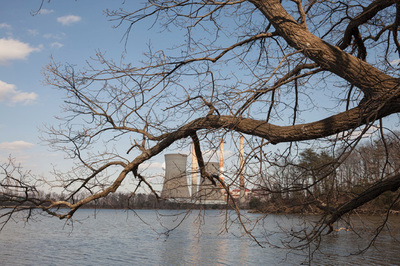The Photography Gallery at Riley Hall is proud to announce Shadowlands: Superfund Sites of the Mid-Atlantic - an exhibition of photographs by George Bedell. The exhibition is open now and will run until February 15.
In 1980, the Comprehensive Environmental Response, Compensation, and Liability Act, frequently referred to as the Superfund, was signed into law. This legislation, designed to clean up the most polluted sites in the country, came on the heels of significant environmental disasters. The Superfund legislation created a mandate, a structure, and a source of funding for the Environmental Protection Agency to clean up areas where toxic waste could affect the health and well-being of Americans. The “fund” part of the Superfund came from a tax on oil and chemical companies, based on the consensus that these industries should help pay for the environmental costs of their products. The tax was paid into a trust fund for the EPA to use in instances where responsible parties could not, or would not, pay for cleanup of identified sites. This tax was abolished in 1995, and the fund was exhausted by 2003. Cleanup of identified sites has slowed proportionally.
George Bedell’s photographic survey began with a simple question: what does a Superfund site look like? This question led to many more. Who are the neighbors of a Superfund site?
What flora and fauna survive there? If you drove by a Superfund site, would you know it, or are they hidden in plain sight? Bedell aims to create a visual resource to document the answers that he finds. He compiles images in an informative manner to create an “atlas” of Superfund sites in the Mid-Atlantic region. In doing so, he draws attention to another question, broader in scope: do we as a society want to leave behind a toxic legacy? In many ways, we seem to have stepped back from a commitment, made 30 years ago, to treat the land differently than we had before and to acknowledge the costs of our industries, and our way of life. Perhaps it would be better to have this discussion now, to renew our commitment, rather than wait to be reminded by another disaster.
